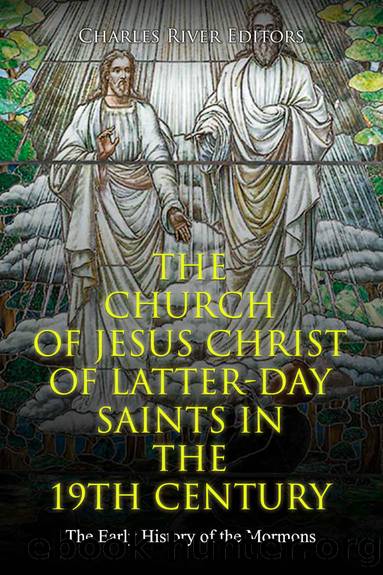The Church of Jesus Christ of Latter-day Saints in the 19th Century: The Early History of the Mormons by Charles River Editors

Author:Charles River Editors
Language: eng
Format: epub
Publisher: Charles River Editors
Published: 2020-05-31T16:00:00+00:00
The meeting appointed a committee to communicate to Young and the leaders of the sect the decisions of the meeting, and they awaited a reply. On September 24, Young gave the committee the following letter, which stated in part:
"We would say to the committee above mentioned and to the Governor, and all the authorities, and people of Illinois, and the surrounding states and territories, that we propose to leave this country next spring, for some point so remote that there will not need to be any difficulty with the people and ourselves, provided certain propositions necessary for the accomplishment of our removal shall be observed, as follows, to-wit:
"That the citizens of this and surrounding counties, and all men, will use their influence and exertion to help us to sell or rent our properties, so as to get means enough that we can help the widow, the fatherless and the destitute to remove with us. "That all men will let us alone with their vexatious lawsuits so that we may have time, for we have broken no law; and help us to cash, dry goods, groceries, good oxen, beef-cattle, sheep, wagons, mules, horses, harness, etc. in exchange for our property, at a fair price, and deeds given at payment, that we may have means to accomplish a removal without the suffering of the destitute to an extent beyond the endurance of human nature.
"That all exchanges of property shall be conducted by a committee, or by committees of both parties; so that all the business may be transacted honorably and speedily.
"That we will use all lawful means, in connection with others, to preserve the public peace while we tarry; and shall expect, decidedly, that we be no more molested with house- burning, or any other depredations, to waste our property and time, and hinder our business.
"That it is a mistaken idea, that we have proposed to remove in six months, for that would be so early in the spring that grass might not grow nor water run; both of which would be necessary for our removal. But we propose to use our influence to have no more seed time and harvest among our people in this country after gathering our present crops; and that all communications to us be made in writing.â
The Quincy Convention was followed by another one in Carthage, described by Joseph Fielding Smith: âResolutions were adopted in which the âMormonsâ were accused of depredations upon the persons and property of the other citizens of Hancock County, and adjudged guilty, in spite of the personal investigation of the governor, himself unfriendly to the Latter-day Saints. Much bitterness of spirit was manifested at this meeting, which decided that it was too late to settle any difficulties between the âMormons'' and the other inhabitants, and only one thing would suffice and that was the removal of the âMormonsâ from the state. They declared that the âMormonsâ were not being persecuted, but were suffering for their dishonest acts; at the same time they
Download
This site does not store any files on its server. We only index and link to content provided by other sites. Please contact the content providers to delete copyright contents if any and email us, we'll remove relevant links or contents immediately.
Resisting Happiness by Matthew Kelly(2888)
The Social Psychology of Inequality by Unknown(2311)
Designing Your Life by Bill Burnett(2265)
Day by Elie Wiesel(2243)
The Giving Tree by Shel Silverstein(1837)
Angels of God: The Bible, the Church and the Heavenly Hosts by Mike Aquilina(1628)
Human Design by Chetan Parkyn(1574)
Augustine: Conversions to Confessions by Robin Lane Fox(1473)
The Supreme Gift by Paulo Coelho(1446)
Hostage to the Devil by Malachi Martin(1396)
7 Secrets of Divine Mercy by Vinny Flynn(1392)
Jesus of Nazareth by Joseph Ratzinger(1378)
Dark Mysteries of the Vatican by H. Paul Jeffers(1341)
The Vatican Pimpernel by Brian Fleming(1340)
Saints & Angels by Doreen Virtue(1311)
St. Thomas Aquinas by G. K. Chesterton(1306)
My Daily Catholic Bible, NABRE by Thigpen Edited by Dr. Paul(1208)
Called to Life by Jacques Philippe(1202)
The Ratline by Philippe Sands(1165)
